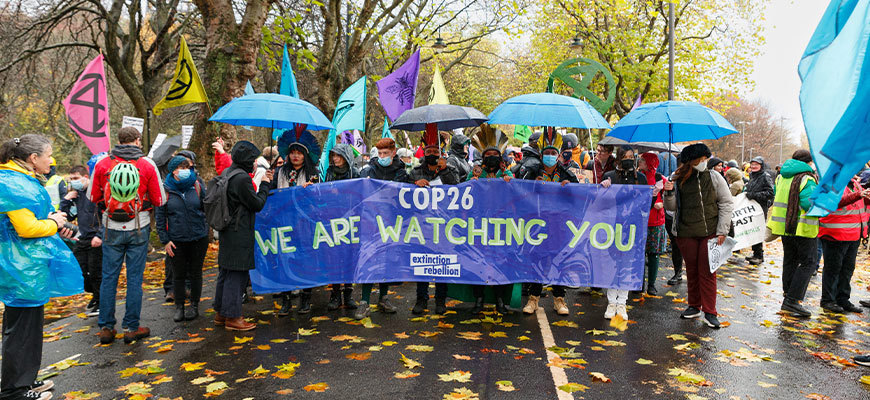Climate change: where do we go now?

It is now more than 18 months since the Law Society of Scotland’s Public Policy Committee established a COP26 & Climate Change Working Group. When we convened our first meeting, little did we know how much work would be undertaken nor how much more there is to do.
The membership of the working group was formed from a number of the Society’s committees with interests including environmental law, energy law, marine law, technology law, equality and diversity, finance, planning law and criminal law. This, in and of itself, demonstrates the cross-cutting nature of the climate crisis and the relevance across all aspects of legal practice.
Although initial proposals for the establishment of the working group had been framed before the publication of the IBA (International Bar Association) Crisis Climate Statement in May 2020, the statement sets the backdrop for the work which has been undertaken by the group since its creation. In the statement, the IBA asserts that: “the legal profession must be prepared to play a leading role in maintaining and strengthening the rule of law and supporting responsible, enlightened governance in an era marked by a climate crisis”.
It sets out a number of calls on lawyers and on bar associations and law societies in relation to the climate crisis. These include matters such as urging lawyers to consider taking a climate-conscious approach to their work and advising clients of the potential risks arising from activity that negatively impacts on the climate; education for law students on the legal elements of the climate crisis and its impact on human rights; developing practical educational tools for qualified lawyers; encouraging lawyers and legal practices to actively support, engage with and record their efforts in combating the climate crisis; and supporting positive changes in the workplace through the adoption of more sustainable practices.
Mindful of that appeal, the work undertaken by the Group has been varied – from starting with surveying the profession on COP26 and climate change, through engaging with a wide range of stakeholders including in relation to the practical arrangements for COP26 being held in Glasgow, producing principles on climate change for use by the Society’s policy committees, and holding a virtual round table on the theme of COP26, Climate Change and Human Rights, to launching a student essay competition and co-editing last October’s climate-themed Journal.
Call to action
The calls to action at the Society’s own COP26 conference, “Lawyers and climate change – leaders or followers?” in October 2021, stress the importance of the profession taking action and showing leadership in this area. Mary Robinson (see Journal, November 2021, 5) noted that it is particularly important that lawyers engage with the mindset of being in a climate crisis because of their potential to be effective and influential in so many ways – in advising clients, litigation, and policymaking. Professor Paul Watchman reflected on how social activism and geopolitical change, compounded with climate change and the demand for equity, equality and transparency within corporations, have accelerated the calls to significantly address ESG (environmental, social and governance) issues, observing that law firms can respond not only by serving clients but must ensure that their own ESG house is in order.
From feedback sought from those in attendance at the conference about climate change and their business, 83% said they or their business were actively thinking about climate change and the steps they might take to reduce their business emissions, and 28% reported that they had been approached by clients for advice on climate issues.
The conference provided a platform for the Society and its members to engage with some of the key issues for the profession, including lawmaking and litigation, ethical issues for the profession associated with climate change, the relevance of gender to the climate crisis, and the role of climate change in legal education. We, as a profession, will need to grapple with these and other issues as we address the climate crisis.
Beyond Glasgow
Reflecting on COP26 itself, while the Glasgow Pact fell short of delivering the national commitments that would together limit warming globally to 1.5°C, there were also major steps forward on several key climate issues. Significantly, public recognition that climate change is the challenge of our time is beyond doubt. That understanding will influence everything across our society and economy. Temperature rises above 1.5°C put parts of the world in danger of being left functionally uninhabitable, due to sea levels rising or extreme weather conditions.
The prominent role played at COP26 by business and finance shifted the focus beyond action by governments and onto the steps being taken by industry and wider society. Indeed, the run-up to the event built tremendous momentum, with considerable media coverage around the climate crisis and COP26 itself, organisations and civil society engaging in climate debate and action, and a number of businesses, including law firms across the UK and beyond, making net zero commitments.
The full implications of COP26 will play out in the coming months and years, but its clear message is that turning words into action is our priority. There is a business, and societal, necessity for individuals and businesses to urgently take ownership and the rapid action necessary to tackle the climate crisis. If you aren’t already doing so, now is the time to undertake meaningful action.
Lawyers are well placed to play a key role in helping to address the climate crisis – as trusted advisers to their clients, lawyers often have a significant role in the business decisions taken around boardroom tables. Lawyers’ skills in analysis, creative problem solving, communication and adaptability will stand the sector in good stead to drive forward change. As clients look to their advisers for solutions, solicitors working across a growing range of sectors will need to develop their own knowledge and understanding of the issues involved so that they can advise clients appropriately.
Growing scrutiny of businesses’ sustainability practices will continue apace in a post-COP26 world. Businesses and public sector bodies are taking a growing interest in the environmental footprint of those they are employing to provide services, and this will almost certainly be felt by the legal services market in the years to come. It will impact on a business’s ability to secure clients, obtain funding, and tender for work, particularly where it is publicly funded work. Employees and prospective employees, notably those at the junior end of the profession, are scrutinising the actions of their firms and organisations and so there are concerns around attracting and retaining the best talent. In short, there are weighty business risks in not taking significant action on climate change.
Continuing role
So, what now for the Society’s working group? The group was established as a medium-term project and now that COP26 has passed, it has been considering the legacy of its work. Much work has been done by the group over the last 18 months; however there is much more to do to ensure that the Scottish legal profession is delivering not only thought leadership but impactful, rapid action.
There will continue to be a role for the consideration of the climate crisis in the context of the Society’s policy and law reform work. The all-encompassing nature of climate change is such that there is a need for those working across all subject areas to consider climate change matters within their areas of focus.
More broadly, the group is contributing to the work to develop the Society’s next strategy. As we look to the years ahead, sustainability will play an increasingly significant role in the legal services market and this strategy provides the opportunity for the Society to demonstrate its commitment to lead the profession in this area by putting sustainability at the very centre of its work.
Regulars
Perspectives
Features
Briefings
- Human rights: Gendered passports survive challenge
- Pensions: Are employers ready for the challenge?
- Succession: Putting it right: scope of the s 3 remedy
- Property: When the debtor defaults
- In-house: Starting an in-house career, in the house!
- Criminal court: New year, familiar issues
- Employment: Is a "right to disconnect" on the horizon?
- Family: Parens patriae: a cross-border issue






